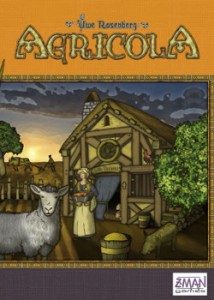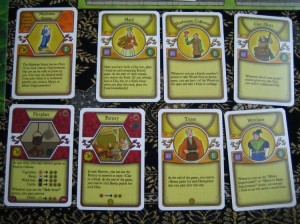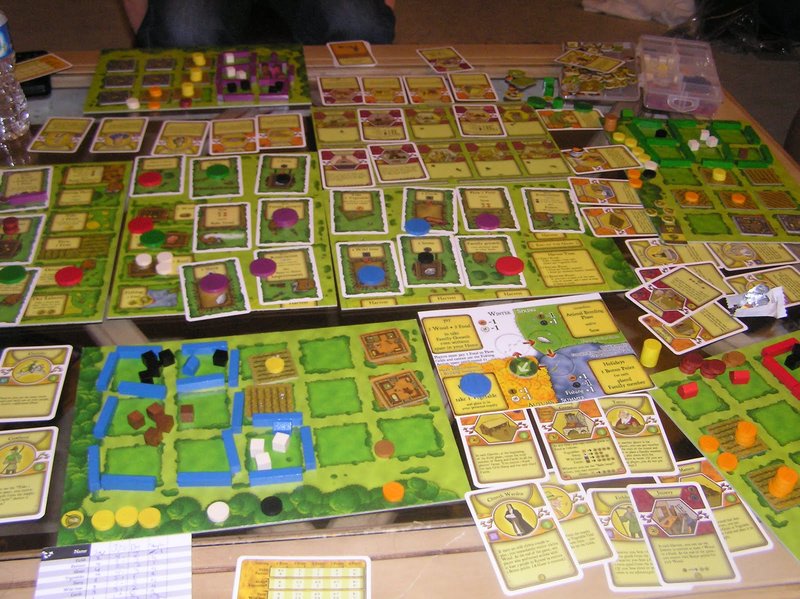If you haven’t figured this out yet, here’s an inside scoop: There are more board games than ever, they are more varied than ever, and they are better designed than ever.
You can build a galactic empire, renegotiate The Cold War, engage in epic fantasy battles, outsmart Cthulu, even relive dogfights from Star Wars.
 All that, and my favorite game is a farming simulation? Yup.
All that, and my favorite game is a farming simulation? Yup.
So what is Agricola, and why do I love it so much? Let me take you through it.
Agricola is played with one (yes, you can go solo) to five players. The goal is to create the farm worth the most points, and points are awarded based on having a diverse and productive farm.
Each player has a 5×3 grid of squares to simulate a farm plot. You start the game with one field and a two-room house. You can use your remaining squares to expand your house, plant wheat and vegetables, and raise animals.
The gameplay is divided into players taking turns to assign their family members to actions, from gathering materials to processing them into food to building “improvements” to having a baby so your family is bigger — and you can take more actions in future turns.
You also have to use your farm to feed your family. Food is the “money” of the game, and if you can’t pay the cost of your farm on each “Harvest” turn, there’s a heavy point penalty and you’re likely to lose.
One important wrinkle is that each action can only be taken once per turn. Want to collect some wood, but somebody’s already done it this turn? Tough luck — wait until next turn.
This adds a tremendous psychological element to go along with the strategic element of Agricola. You have to track what your opponents are doing and guess what their next steps are as you try to remain unpredictable yourself.
I think Agricola has the right amount of complexity (though some I’ve shown it to have categorized it as “over-complex”). There are about a half dozen materials to keep track of and half dozen mechanics at your disposal. It’s open-ended and never repetitive.
But it’s also simple enough to play: Generate enough food to feed your family and fill all the squares. That’s all you have to do to survive. But it only scratches the surface of what’s needed to thrive.
 The thing that pushes Agricola over the top, though, is its huge variety. Each game each player draws “Occupation” cards and “Minor Improvement” cards that only he can use. These cards often interact and chain in interesting ways, completely upending old strategies in favor of new ones.
The thing that pushes Agricola over the top, though, is its huge variety. Each game each player draws “Occupation” cards and “Minor Improvement” cards that only he can use. These cards often interact and chain in interesting ways, completely upending old strategies in favor of new ones.
This means that every time you play Agricola is different from the last. Some strategies you may never have considered — building and renovating a large house — can become the smartest course of action. You have to play differently. Thus, your brain is engaged in new ways around a familiar framework.
Lastly — and this is important and somewhat uncommon among board games — Agricola games usually last about an hour, including setup and cleanup (assuming you don’t have to explain the rules). It’s a brisk game that doesn’t hang around enough to lose your attention.
Agricola’s combination of deep gameplay, psychological competitiveness, short playtime, and tremendous variety has resulted in our copy of the game becoming well worn. Katy and I have probably played upwards of fifty times, and we still keep coming back.
When you’ve played as much as we have, certain annoyances pop up — some cards and actions seem overpowered, and the early portion of the game usually plays very similarly, making it the most dry segment of gameplay.
But these to me seem less like flaws and more like quirks that are just part of the game’s flow. They’re definitely not enough to give me hesitation to play another round.
The whole package adds up to a tremendously fun board game, one that I have no hesitation calling my absolute favorite. If you ever — EVER — want to play, just say the word. I’ll be there.
![]()




